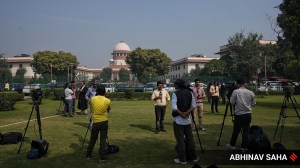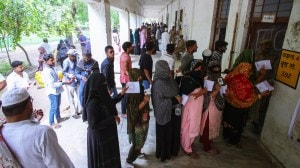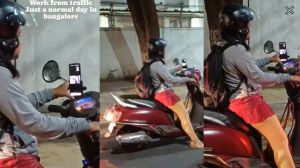- India
- International
Gujarat: Average Covid testing low in June despite high test positivity rate
An analysis of the spread of coronavirus during Unlock-1 shows Gujarat tested 13,700 more samples in June than in May and yet reported a higher daily average of new cases, indicating a higher test positivity rate.
 In Ahmedabad, testing dropped in June, at 1,800 samples a day against May when 2,000 samples were tested several days.
In Ahmedabad, testing dropped in June, at 1,800 samples a day against May when 2,000 samples were tested several days.
Gujarat has the capacity to test 7,000 to 8,000 samples a day for Covid-19 by various methods but the average testing per day in June was just 5,300. Two advisories from the Indian Council of Medical Research (ICMR) — on June 19 and July 1 — had advised states to ramp up testing and utilise private labs to their optimal capacity.
An analysis of the spread of coronavirus during Unlock-1 shows Gujarat tested 13,700 more samples in June than in May and yet reported a higher daily average of new cases, indicating a higher test positivity rate.
From May 1 to 31, the state tested 1,47,923 lakh samples, which included a week of targeted testing of superspreaders in Ahmedabad. After the intervention of the Gujarat High Court following repeated representations by the Ahmedabad Medical Association and Indian Medical Association Gujarat chapter before the health department as well as the HC, the state health department revised its testing policy at least twice in June.
From June 1 to June 30, 1,61,625 tests were conducted, when average per day was 5,300 against the May average of around 4,700 samples a day. Despite the marginal increase, the test positivity rate only increased in June to 10.4 per cent from May when the one-month test positivity rate stood at 8.38 per cent. Till Saturday, Gujarat tested 4,12,124 samples.
In Ahmedabad, testing dropped in June, at 1,800 samples a day against May when 2,000 samples were tested several days. In June, however, with Ahmedabad reporting as many as 8,700 cases, the test positivity rate remained high at over 16 per cent.

An epidemiologist with the state health department says, “The state now has the capacity to test 7,000 to 8,000 samples a day in 32 government laboratories and 15 private laboratories. Private laboratories have the capacity of approximately 1,000 samples but not all of it is utilised.”
The ICMR has approved 33 government and 19 private labs, while one government lab and four private labs are yet to receive the state department’s approval. The state health department is awaiting procurement of antigen testing kits although some municipal corporations such as the AMC have procured them directly.
A letter from director general of ICMR, Dr Balram Bhargava, to all state chief secretaries on June 19 advised ramping up of testing in containment zones and even primary health centres. A second letter of July 1 from the ICMR to state chief secretaries also noted that in some states, testing in private labs “is grossly suboptimal” and should be fully utilised. It also strongly recommended that laboratories “should be free to test” in accordance to the ICMR guidelines.
For most part of May, the government barred private laboratories from testing citing that they needn’t step in till government capacity was not exhausted, but it was later permitted on approval by the chief district health officer or the medical officer of health in the district. In June, it was revised to include only an intimation. The policy was further revised to test suspected symptomatic patients on recommendation by an MD. On June 25, prices were also capped at Rs 2,500 for walk-in and Rs 3,000 if sample collection from home.
For districts such as Gandhinagar, Surat, Mehsana, Rajkot and Vadodara, daily testing rate remained consistent throughout the month of unlock, at 100-odd samples or fewer, except for Vadodara and Surat, where the samples ranged between 400 and 500 per day.
At present, the state allows testing of symptomatic patients prescribed by MD specialists. No action was taken on AMA president Dr Mona Desai’s repeated representations to the health department to allow any treating physician, including MBBS doctors, to recommend test. The matter is now being considered before the Gujarat High Court.
“Testing is not a big deal where you need specialists, even MBBS doctors can do the same. Active surveillance has stopped in the city anyway,” she said, reasoning that rural area PHCs often have MBBS doctors and thus the specification of a test prescribed by an MD would make it difficult to diagnose for COVID19.
Several doctors have also expressed concerns on the low testing numbers. “Testing is being reduced to remove the fear but now people are moving around without any fear and it would only worsen,” said one private practitioner.
An epidemiologist with the state health department said active suveillance has stopped across the state, except in containment zones. “We are not doing any active surveillance other than in containment zones. We can test only those with acute respiratory infections or influenza-like symptoms… As a result, we may not be testing at full capacity every day,” the epidemiologist said.
Pointing out that the testing should be two-fold, a senior public health expert said, “In the first group, report the number of suspected patients based on symptoms, and then report the number tested among them. Second group is among those suspected patients, report their symptomatic contacts and then report those tested among them. Once we have this data, can we effectively say if the testing is on par with ground reality.”
Apr 26: Latest News
- 01
- 02
- 03
- 04
- 05








































